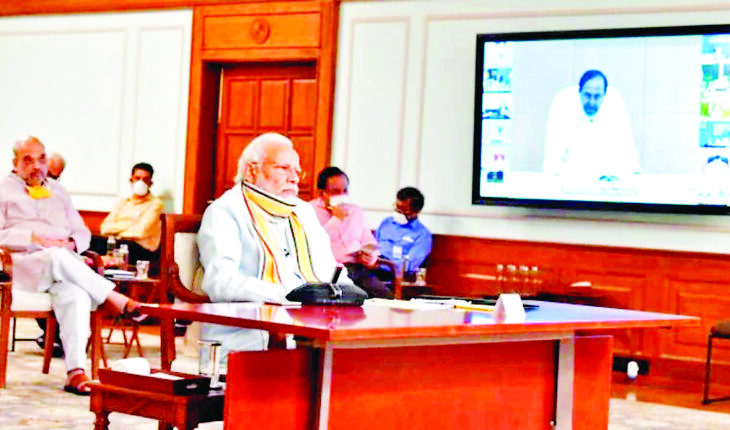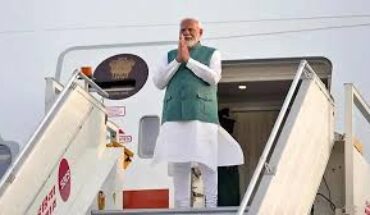TP Sreenivasan recounts developments that create a kind of lull on the foreign policy front,The gravity of the COVID-19 situation, which has not yet abated; impasse on the border with China; severe restrictions on travel; the unsettled situation in the U.S., with three weeks to go for Joe Biden to be sworn in as President; and the game-changing developments in West Asia have created a kind of lull on the foreign policy front. But below the surface, there is feverish activity to figure out future policies. Every straw in the wind in the statements, speeches and seemingly isolated reports emanating from South Block needs to be watched.
Modiplomacy 2.0 appears to be evolving differently from its first incarnation. The stage, which was set during the first term of the government, has turned out to be inadequate for the new choreography, which is changing minute by minute. China’s intransigence is beyond comprehension. The frustration over the continuing occupation of Indian territory by China is evident in all pronouncements at all levels. The comfort level with the Donald Trump administration over China has disappeared and the focus is on Mr. Biden’s formula in dealing with China. Quad was a tantalising possibility, but avoiding the ‘C’ word in the new vocabulary has become a liability. Determination and resolve are evident in Indian statements, but so is the sense of limited options. All that emerges from South Block is willingness to negotiate and readiness to meet any eventuality.
India’s pandemic diplomacy figures prominently in the projection of its foreign policy. We take pride in the fact that we went to the rescue of many countries with relief supplies, medicines and equipment. The emphasis that India put on global cooperation to deal with the global challenge seems to have made an impact. A spike in demand from different countries for pharmaceuticals, especially hydroxychloroquine and paracetamol, made India ramp up production. Today, the focus has shifted to vaccine production and rapid testing, both essential for the return to normalcy. India is deeply involved in many international collaborations and initiatives.
India is proud of its contribution to international mobility and migration. As people sought to return to their homes, cooperation between governments to prepare the necessary logistics and protocol was central to that objective. In India’s case, more than 2.5 million citizens came back. More importantly, we supported the movement of more than 1,10,000 foreigners out of India to 120 countries. India’s stress on multilateralism and international cooperation seems to have been appreciated.
An increasingly visible integration of foreign and defence policies has added a new dimension to policymaking and execution. The visit of the Chief of the Army Staff and the Foreign Secretary to Myanmar could not go unnoticed. Nepal saw the visits of the Chief of the Research and Analysis Wing, the Chief of the Army Staff, and the Foreign Secretary. “To my mind, adequately securitising foreign policy is for me an absolute imperative. And the primary reason for that is quite obvious: there are really very few major states that still have unsettled borders to the extent that we do,” said External Affairs Minister S. Jaishankar. “Of equal relevance is the unique challenge we face of years of intense terrorism inflicted on us by a neighbour. We also cannot disregard any attempts to undermine our national integrity and unity. Over and above these exceptional factors, there are the daily security challenges of long borders and large sea space. The thinking and planning of a polity that operates in such an uncertain environment naturally will give primacy, should give primacy to hard security,” he said.
There have been hints of India distancing itself from globalisation, following India’s decision to keep out of the Regional Comprehensive Economic Partnership. It has been stated officially that globalisation and trade agreements have resulted in de-industrialisation in certain sectors. The concept of ‘Atmanirbharta’ appears to be a precursor to reducing dependence on countries like China, even though we know that boycotting Chinese goods and investments is impractical at present. India joining the Chinese Belt and Road Initiative has become even more remote now.
Intolerance
Another trend that is visible of late is intolerance of international criticism of internal developments. Some of the measures that countries take to express displeasure over statements or actions of other countries that are prejudicial to their own national interests include slapping trade sanctions, refusing to recognise the government in power, and getting the critical country expelled from international organisations. India has resorted to these measures judiciously over the years. These exceptional diplomatic actions are taken rarely and after considerable thought. That is why every such action is judged on merits, taking care that its adversarial impact is minimum even while conveying a strong message. In recent times, two boycotts by Mr. Jaishankar have been seen as increased intolerance of external criticism. The first was his decision not to meet Democratic Congresswoman Pramila Jayapal owing to her unflattering view of the government’s handling of the Kashmir issue. Senator Bernie Sanders and Indian-origin Senator Kamala Harris, now Vice-President-elect, criticised India for ‘silencing’ its critic. Ms. Harris tweeted: “It’s wrong for any foreign government to tell Congress what members are allowed in meetings on Capitol Hill.”
The second boycott was even more significant as it involved a Ministerial meeting on COVID-19 convened by Canada. The reason for the boycott was Prime Minister Justin Trudeau’s statement on the agitation of Indian farmers, consisting largely of Sikhs. The Canadian High Commissioner was summoned by the External Affairs Ministry to be told that the statements made by “the Canadian Prime Minister, some Cabinet Ministers and Members of Parliament on issues relating to Indian farmers constitute an unacceptable interference in our internal affairs.” The Ministry said that such actions, if continued, would have a “seriously damaging impact” on ties between India and Canada, characterising some pronouncements as “legitimising extremist activism”. Mr. Trudeau continued to maintain his criticism as the Sikh community in Canada intensified its criticism of India.
The British Foreign Secretary was more diplomatic when he explained that Sikh politics had become part of U.K. politics and hence the request from some British MPs to him to intercede with India on behalf of the farmers. At a time when there is some criticism of the invitation extended to the British Prime Minister to be the Chief Guest at the Republic Day parade, neither side wants to rock the boat. India’s policy is to be supportive of our diaspora abroad and we could have been tolerant of such criticism abroad. Every country counts in these days of global rebalancing. Much of the permutations and combinations being worked out in South Block will emerge as the new norm settles down.
T.P. Sreenivasan, a former Ambassador of India, is Director General, Kerala International Centre. Views expressed are his own
Straws in the wind in South Block
Published Date: 04-01-2021 | 2:18 pm




